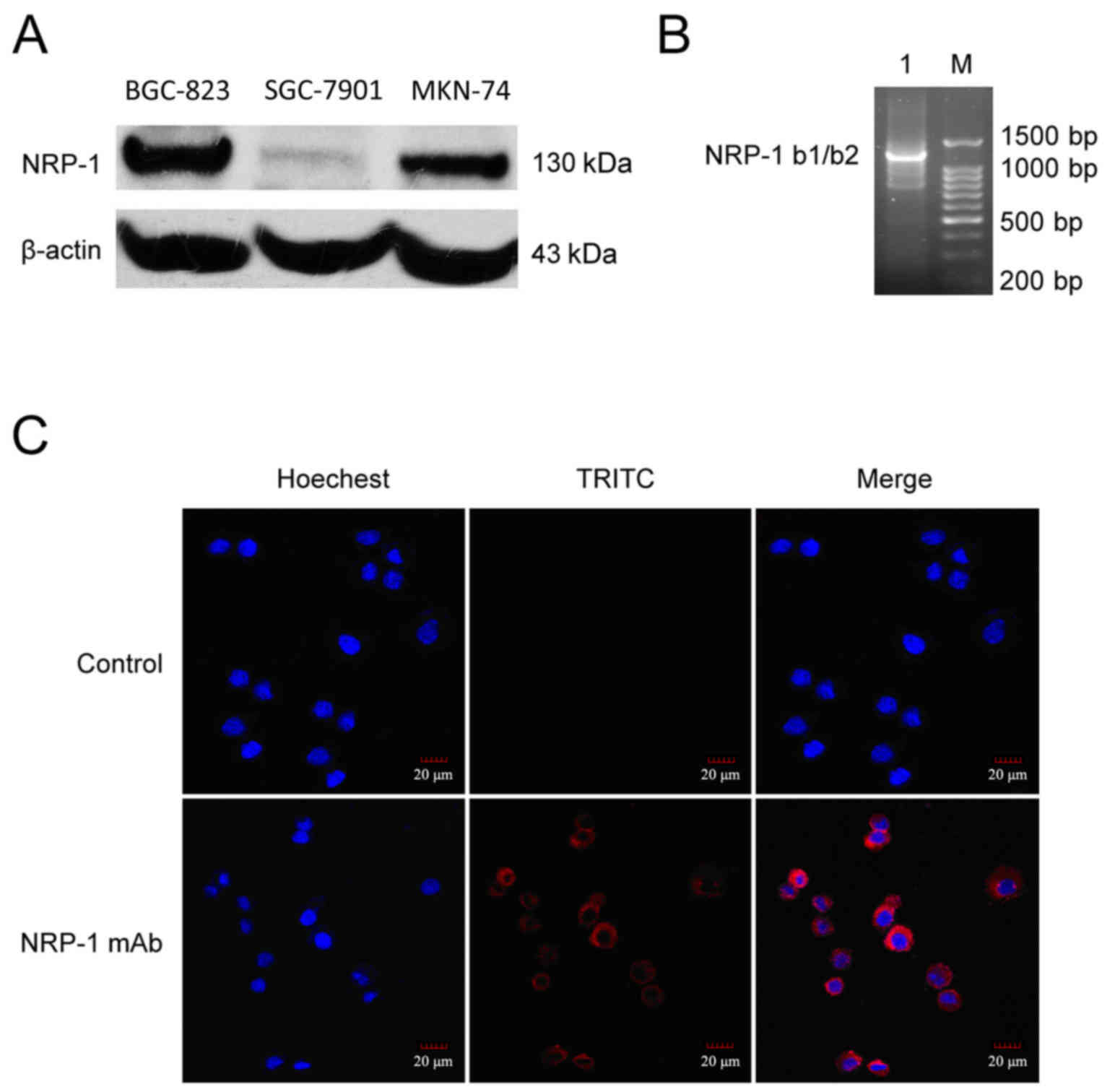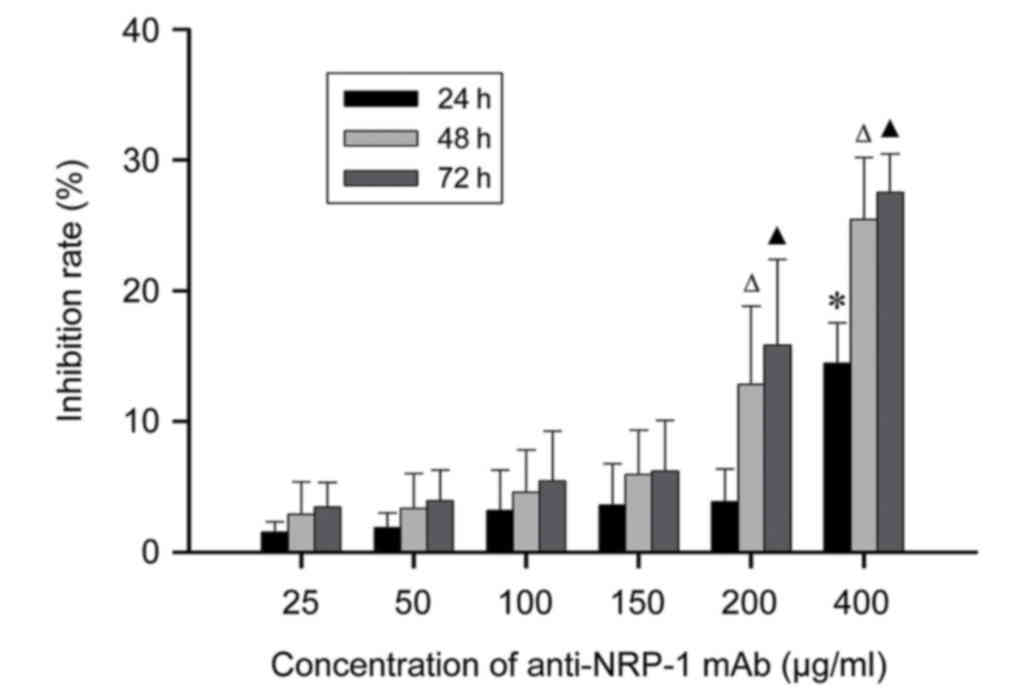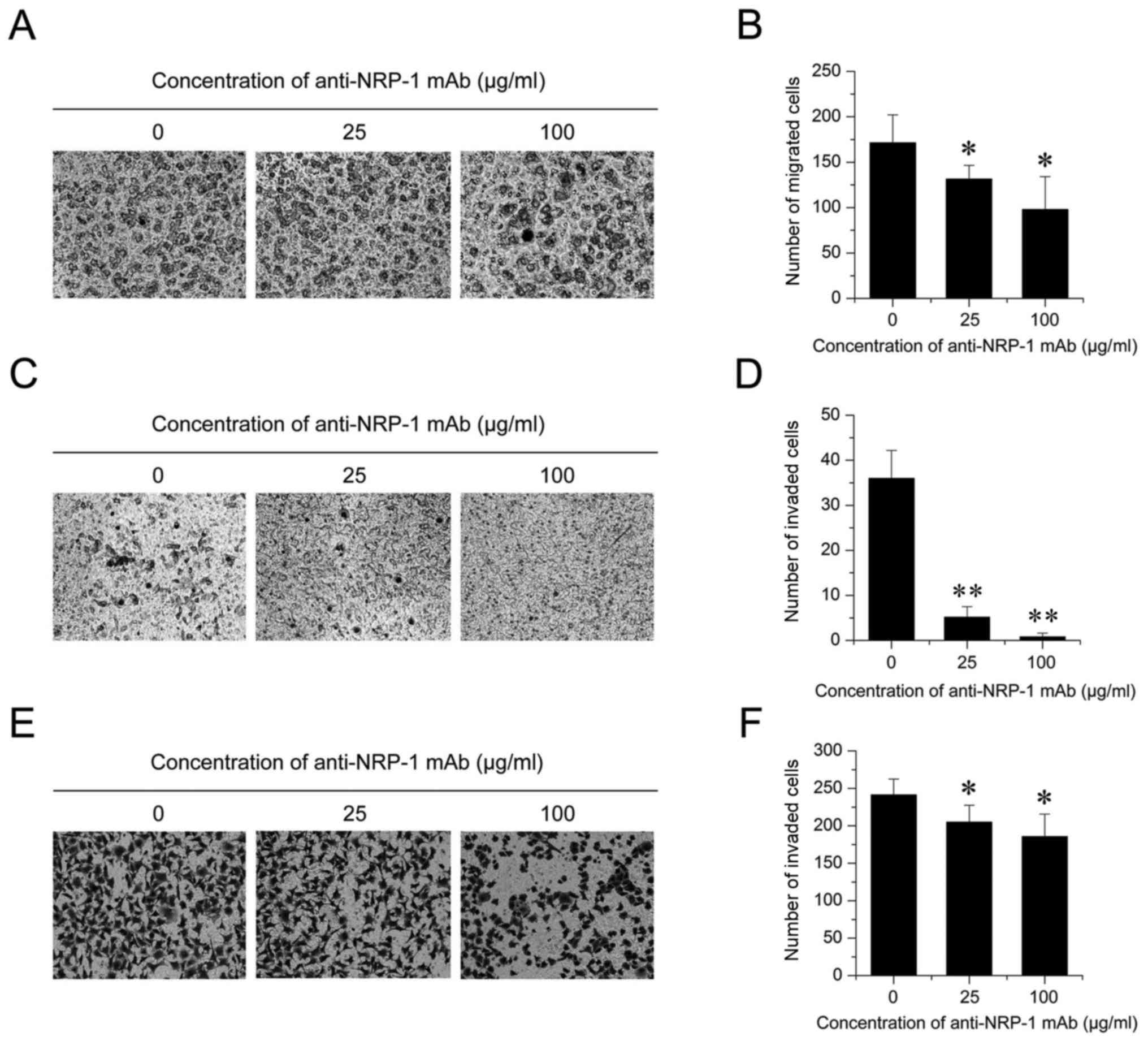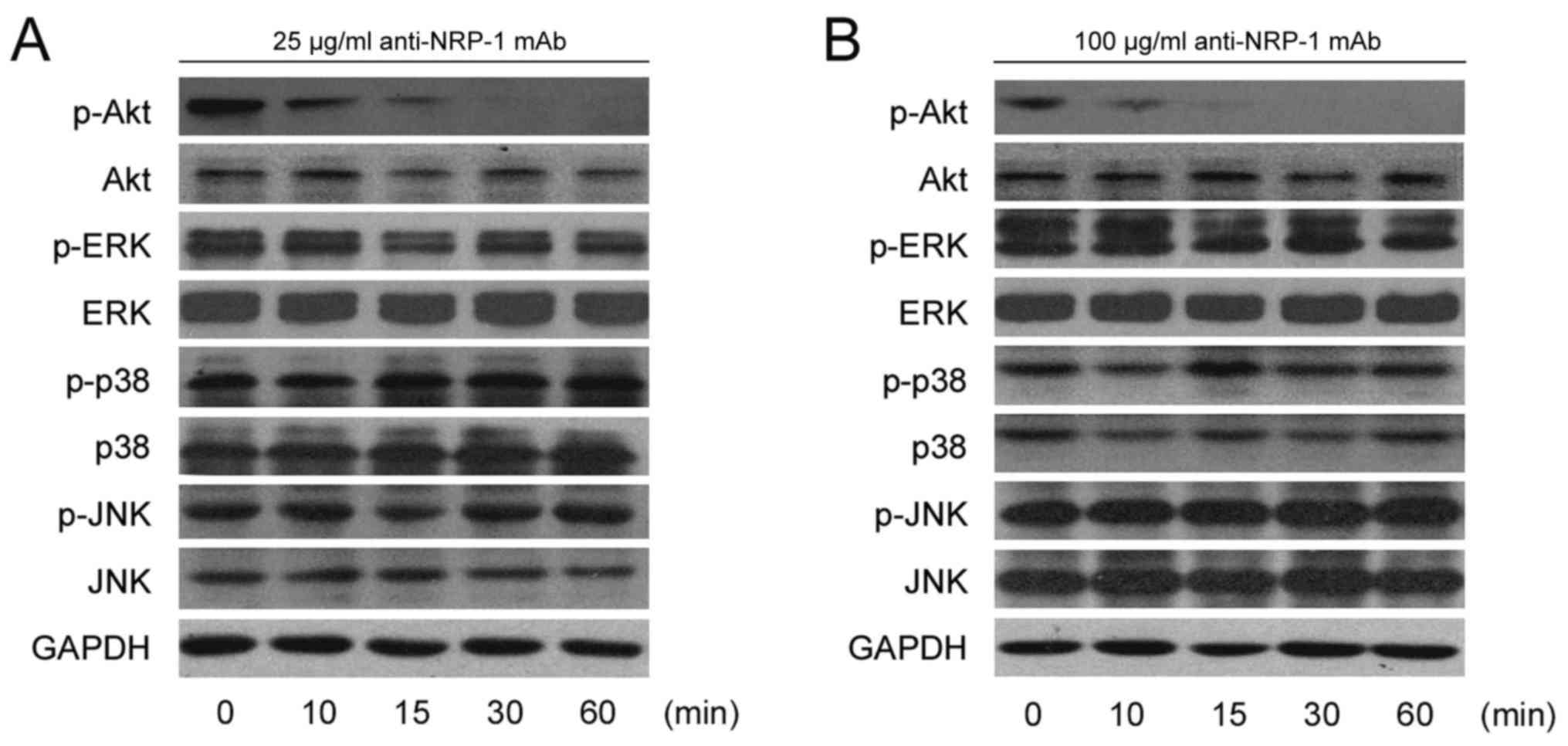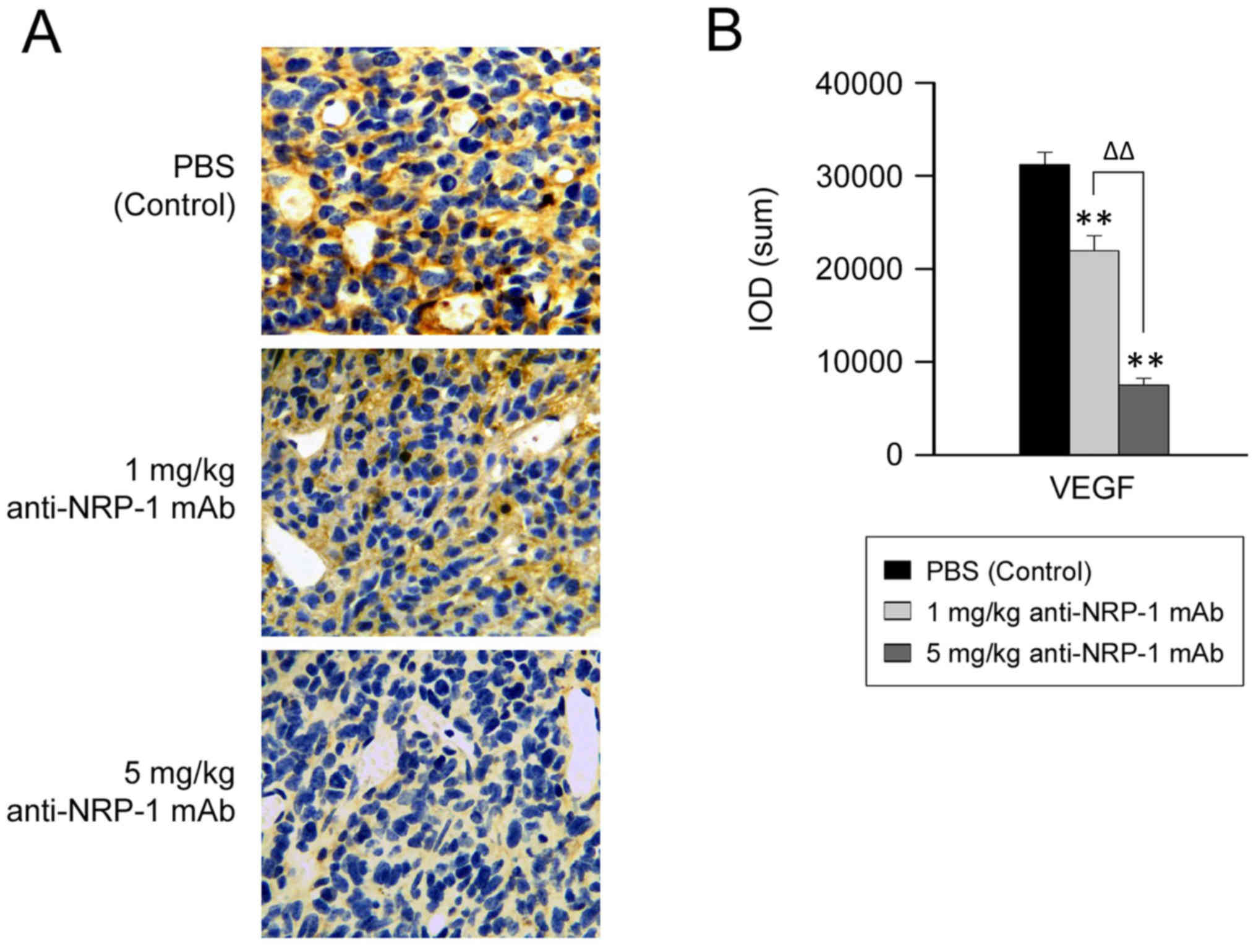|
1
|
Fujisawa H, Takagi S and Hirata T:
Growth-associated expression of a membrane protein, neuropilin, in
Xenopus optic nerve fibers. Dev Neurosci. 17:343–349. 1995.
View Article : Google Scholar : PubMed/NCBI
|
|
2
|
Fujisawa H and Kitsukawa T: Receptors for
collapsin/semaphorins. Curr Opin Neurobiol. 8:587–592. 1998.
View Article : Google Scholar : PubMed/NCBI
|
|
3
|
Soker S: Neuropilin in the midst of cell
migration and retraction. Int J Biochem Cell Biol. 33:433–437.
2001. View Article : Google Scholar : PubMed/NCBI
|
|
4
|
He Z and Tessier-Lavigne M: Neuropilin is
a receptor for the axonal chemorepellent Semaphorin III. Cell.
90:739–751. 1997. View Article : Google Scholar : PubMed/NCBI
|
|
5
|
Gray MJ, Wey JS, Belcheva A, McCarty MF,
Trevino JG, Evans DB, Ellis LM and Gallick GE: Neuropilin-1
suppresses tumorigenic properties in a human pancreatic
adenocarcinoma cell line lacking neuropilin-1 coreceptors. Cancer
Res. 65:3664–3670. 2005. View Article : Google Scholar : PubMed/NCBI
|
|
6
|
Nakamura F, Tanaka M, Takahashi T, Kalb RG
and Strittmatter SM: Neuropilin-1 extracellular domains mediate
semaphorin D/III-induced growth cone collapse. Neuron.
21:1093–1100. 1998. View Article : Google Scholar : PubMed/NCBI
|
|
7
|
Pellet-Many C, Frankel P, Jia H and
Zachary I: Neuropilins: Structure, function and role in disease.
Biochem J. 411:211–226. 2008. View Article : Google Scholar : PubMed/NCBI
|
|
8
|
Ochiumi T, Kitadai Y, Tanaka S, Akagi M,
Yoshihara M and Chayama K: Neuropilin-1 is involved in regulation
of apoptosis and migration of human colon cancer. Int J Oncol.
29:105–116. 2006.PubMed/NCBI
|
|
9
|
Chaudhary B, Khaled YS, Ammori BJ and
Elkord E: Neuropilin 1: Function and therapeutic potential in
cancer. Cancer Immunol Immunother. 63:81–99. 2014. View Article : Google Scholar : PubMed/NCBI
|
|
10
|
Dzionek A, Fuchs A, Schmidt P, Cremer S,
Zysk M, Miltenyi S, Buck DW and Schmitz J: BDCA-2, BDCA-3, and
BDCA-4: Three markers for distinct subsets of dendritic cells in
human peripheral blood. J Immunol. 165:6037–6046. 2000. View Article : Google Scholar : PubMed/NCBI
|
|
11
|
Romeo PH, Lemarchandel V and Tordjman R:
Neuropilin-1 in the immune system. Adv Exp Med Biol. 515:49–54.
2002. View Article : Google Scholar : PubMed/NCBI
|
|
12
|
Tordjman R, Lepelletier Y, Lemarchandel V,
Cambot M, Gaulard P, Hermine O and Roméo PH: A neuronal receptor,
neuropilin-I, is essential for the initiation of the primary immune
response. Nat Immunol. 3:477–482. 2002. View Article : Google Scholar : PubMed/NCBI
|
|
13
|
Herzog Y, Kalcheim C, Kahane N, Reshef R
and Neufeld G: Differential expression of neuropilin-1 and
neuropilin-2 in arteries and veins. Mech Dev. 109:115–119. 2001.
View Article : Google Scholar : PubMed/NCBI
|
|
14
|
Battaglia A, Buzzonetti A, Monego G, Peri
L, Ferrandina G, Fanfani F, Scambia G and Fattorossi A:
Neuropilin-1 expression identifies a subset of regulatory T cells
in human lymph nodes that is modulated by preoperative
chemoradiation therapy in cervical cancer. Immunology. 123:129–138.
2008. View Article : Google Scholar : PubMed/NCBI
|
|
15
|
Parikh AA, Fan F, Liu WB, Ahmad SA,
Stoeltzing O, Reinmuth N, Bielenberg D, Bucana CD, Klagsbrun M and
Ellis LM: Neuropilin-1 in human colon cancer: Expression,
regulation, and role in induction of angiogenesis. Am J Pathol.
164:2139–2151. 2004. View Article : Google Scholar : PubMed/NCBI
|
|
16
|
Ghosh S, Sullivan CA, Zerkowski MP,
Molinaro AM, Rimm DL, Camp RL and Chung GG: High levels of vascular
endothelial growth factor and its receptors (VEGFR-1, VEGFR-2,
neuropilin-1) are associated with worse outcome in breast cancer.
Hum Pathol. 39:1835–1843. 2008. View Article : Google Scholar : PubMed/NCBI
|
|
17
|
Hong TM, Chen YL, Wu YY, Yuan A, Chao YC,
Chung YC, Wu MH, Yang SC, Pan SH, Shih JY, et al: Targeting
neuropilin 1 as an antitumor strategy in lung cancer. Clin Cancer
Res. 13:4759–4768. 2007. View Article : Google Scholar : PubMed/NCBI
|
|
18
|
Hansel DE, Wilentz RE, Yeo CJ, Schulick
RD, Montgomery E and Maitra A: Expression of neuropilin-1 in
high-grade dysplasia, invasive cancer, and metastases of the human
gastrointestinal tract. Am J Surg Pathol. 28:347–356. 2004.
View Article : Google Scholar : PubMed/NCBI
|
|
19
|
Evans IM, Yamaji M, Britton G, Pellet-Many
C, Lockie C, Zachary IC and Frankel P: Neuropilin-1 signaling
through p130Cas tyrosine phosphorylation is essential for growth
factor-dependent migration of glioma and endothelial cells. Mol
Cell Biol. 31:1174–1185. 2011. View Article : Google Scholar : PubMed/NCBI
|
|
20
|
Latil A, Bièche I, Pesche S, Valèri A,
Fournier G, Cussenot O and Lidereau R: VEGF overexpression in
clinically localized prostate tumors and neuropilin-1
overexpression in metastatic forms. Int J Cancer. 89:167–171. 2000.
View Article : Google Scholar : PubMed/NCBI
|
|
21
|
Prud'homme GJ and Glinka Y: Neuropilins
are multifunctional coreceptors involved in tumor initiation,
growth, metastasis and immunity. Oncotarget. 3:921–939. 2012.
View Article : Google Scholar : PubMed/NCBI
|
|
22
|
Zeng F, Luo F, Lv S, Zhang H, Cao C, Chen
X, Wang S, Li Z, Wang X, Dou X, et al: A monoclonal antibody
targeting neuropilin-1 inhibits adhesion of MCF7 breast cancer
cells to fibronectin by suppressing the FAK/p130cas signaling
pathway. Anticancer Drugs. 25:663–672. 2014.PubMed/NCBI
|
|
23
|
Jubb AM, Strickland LA, Liu SD, Mak J,
Schmidt M and Koeppen H: Neuropilin-1 expression in cancer and
development. J Pathol. 226:50–60. 2012. View Article : Google Scholar : PubMed/NCBI
|
|
24
|
Bergé M, Bonnin P, Sulpice E, Vilar J,
Allanic D, Silvestre JS, Lévy BI, Tucker GC, Tobelem G and
Merkulova-Rainon T: Small interfering RNAs induce
target-independent inhibition of tumor growth and vasculature
remodeling in a mouse model of hepatocellular carcinoma. Am J
Pathol. 177:3192–3201. 2010. View Article : Google Scholar : PubMed/NCBI
|
|
25
|
Raskopf E, Vogt A, Standop J, Sauerbruch T
and Schmitz V: Inhibition of neuropilin-1 by RNA-interference and
its angiostatic potential in the treatment of hepatocellular
carcinoma. Z Gastroenterol. 48:21–27. 2010. View Article : Google Scholar : PubMed/NCBI
|
|
26
|
Lu L, Zhang L, Xiao Z, Lu S, Yang R and
Han ZC: Neuropilin-1 in acute myeloid leukemia: Expression and role
in proliferation and migration of leukemia cells. Leuk Lymphoma.
49:331–338. 2008. View Article : Google Scholar : PubMed/NCBI
|
|
27
|
Barr MP, Byrne AM, Duffy AM, Condron CM,
Devocelle M, Harriott P, Bouchier-Hayes DJ and Harmey JH: A peptide
corresponding to the neuropilin-1-binding site on VEGF(165) induces
apoptosis of neuropilin-1-expressing breast tumour cells. Br J
Cancer. 92:328–333. 2005. View Article : Google Scholar : PubMed/NCBI
|
|
28
|
Tirand L, Frochot C, Vanderesse R, Thomas
N, Trinquet E, Pinel S, Viriot ML, Guillemin F and Barberi-Heyob M:
A peptide competing with VEGF165 binding on neuropilin-1 mediates
targeting of a chlorin-type photosensitizer and potentiates its
photodynamic activity in human endothelial cells. J Control
Release. 111:153–164. 2006. View Article : Google Scholar : PubMed/NCBI
|
|
29
|
Jia H, Cheng L, Tickner M, Bagherzadeh A,
Selwood D and Zachary I: Neuropilin-1 antagonism in human carcinoma
cells inhibits migration and enhances chemosensitivity. Br J
Cancer. 102:541–552. 2010. View Article : Google Scholar : PubMed/NCBI
|
|
30
|
Jarvis A, Allerston CK, Jia H, Herzog B,
Garza-Garcia A, Winfield N, Ellard K, Aqil R, Lynch R, Chapman C,
et al: Small molecule inhibitors of the neuropilin-1 vascular
endothelial growth factor A (VEGF-A) interaction. J Med Chem.
53:2215–2226. 2010. View Article : Google Scholar : PubMed/NCBI
|
|
31
|
Gagnon ML, Bielenberg DR, Gechtman Z, Miao
HQ, Takashima S, Soker S and Klagsbrun M: Identification of a
natural soluble neuropilin-1 that binds vascular endothelial growth
factor: In vivo expression and antitumor activity. Proc Natl Acad
Sci USA. 97:2573–2578. 2000. View Article : Google Scholar : PubMed/NCBI
|
|
32
|
Grandclement C and Borg C: Neuropilins: A
new target for cancer therapy. Cancers (Basel). 3:1899–1928. 2011.
View Article : Google Scholar : PubMed/NCBI
|
|
33
|
Starzec A, Ladam P, Vassy R, Badache S,
Bouchemal N, Navaza A, du Penhoat CH and Perret GY:
Structure-function analysis of the antiangiogenic ATWLPPR peptide
inhibiting VEGF(165) binding to neuropilin-1 and molecular dynamics
simulations of the ATWLPPR/neuropilin-1 complex. Peptides.
28:2397–2402. 2007. View Article : Google Scholar : PubMed/NCBI
|
|
34
|
Bondeva T, Rüster C, Franke S,
Hammerschmid E, Klagsbrun M, Cohen CD and Wolf G: Advanced
glycation end-products suppress neuropilin-1 expression in
podocytes. Kidney Int. 75:605–616. 2009. View Article : Google Scholar : PubMed/NCBI
|
|
35
|
Bondeva T and Wolf G: Advanced glycation
end products suppress neuropilin-1 expression in podocytes by a
reduction in Sp1-dependent transcriptional activity. Am J Nephrol.
30:336–345. 2009. View Article : Google Scholar : PubMed/NCBI
|
|
36
|
Bondeva T, Wojciech S and Wolf G: Advanced
glycation end products inhibit adhesion ability of differentiated
podocytes in a neuropilin-1-dependent manner. Am J Physiol Renal
Physiol. 301:F852–F870. 2011. View Article : Google Scholar : PubMed/NCBI
|
|
37
|
Teesalu T, Sugahara KN, Kotamraju VR and
Ruoslahti E: C-end rule peptides mediate neuropilin-1-dependent
cell, vascular, and tissue penetration. Proc Natl Acad Sci USA.
106:16157–16162. 2009. View Article : Google Scholar : PubMed/NCBI
|
|
38
|
Haspel N, Zanuy D, Nussinov R, Teesalu T,
Ruoslahti E and Aleman C: Binding of a C-end rule peptide to the
neuropilin-1 receptor: A molecular modeling approach. Biochemistry.
50:1755–1762. 2011. View Article : Google Scholar : PubMed/NCBI
|
|
39
|
Rizzolio S, Rabinowicz N, Rainero E,
Lanzetti L, Serini G, Norman JC, Neufeld G and Tamagnone L:
Neuropilin-1 dependent regulation of EGF-Receptor signaling. Cancer
Res. 72:5801–5811. 2012. View Article : Google Scholar : PubMed/NCBI
|
|
40
|
Liang WC, Dennis MS, Stawicki S, Chanthery
Y, Pan Q, Chen Y, Eigenbrot C, Yin J, Koch AW, Wu X, et al:
Function blocking antibodies to neuropilin-1 generated from a
designed human synthetic antibody phage library. J Mol Biol.
366:815–829. 2007. View Article : Google Scholar : PubMed/NCBI
|
|
41
|
Pan Q, Chanthery Y, Liang WC, Stawicki S,
Mak J, Rathore N, Tong RK, Kowalski J, Yee SF, Pacheco G, et al:
Blocking neuropilin-1 function has an additive effect with
anti-VEGF to inhibit tumor growth. Cancer Cell. 11:53–67. 2007.
View Article : Google Scholar : PubMed/NCBI
|
|
42
|
Li X, Luo F, Wang S, Ni E, Tang X, Lv H,
Chen X, Chen L and Yan J: Monoclonal Antibody Against NRP-1 b1b2.
Hybridoma (Larchmt). 30:369–373. 2011. View Article : Google Scholar : PubMed/NCBI
|
|
43
|
Chen L, Miao W, Tang X, Zhang H, Wang S,
Luo F and Yan J: Inhibitory Effect of Neuropilin-1 monoclonal
antibody (NRP-1 MAb) on glioma tumor in mice. J Biomed Nanotechnol.
9:551–558. 2013. View Article : Google Scholar : PubMed/NCBI
|
|
44
|
Dallas NA, Gray MJ, Xia L, Fan F, van
Buren G II, Gaur P, Samuel S, Lim SJ, Arumugam T, Ramachandran V,
et al: Neuropilin-2-mediated tumor growth and angiogenesis in
pancreatic adenocarcinoma. Clin Cancer Res. 14:8052–8060. 2008.
View Article : Google Scholar : PubMed/NCBI
|
|
45
|
Wang Y, Wang S, Ding Y, Ye Y, Xu Y, He H,
Li Q, Mi Y, Guo C, Lin Z, et al: A suppressor of cytokine signaling
1 antagonist enhances antigen-presenting capacity and tumor cell
antigen-specific cytotoxic T lymphocyte responses by human
monocyte-derived dendritic cells. Clin Vaccine Immunol.
20:1449–1456. 2013. View Article : Google Scholar : PubMed/NCBI
|
|
46
|
Wu N, Wang Y, Wang S, Chen Y and Yan J:
Recombinant human leptin induces growth inhibition and apoptosis in
human gastric cancer MGC-803 cells. Clin Exp Med. 13:305–314. 2013.
View Article : Google Scholar : PubMed/NCBI
|
|
47
|
Li YJ, Sun LC, He Y, Liu XH, Liu M, Wang
QM and Jin XM: The anti-tumor properties of two tumstatin peptide
fragments in human gastric carcinoma. Acta Pharmacologica Sinica.
30:1307–1315. 2009. View Article : Google Scholar : PubMed/NCBI
|
|
48
|
Cai Y, Wang R, Zhao YF, Jia J, Sun ZJ and
Chen XM: Expression of Neuropilin-2 in salivary adenoid cystic
carcinoma: Its implication in tumor progression and angiogenesis.
Pathol Res Pract. 206:793–799. 2010. View Article : Google Scholar : PubMed/NCBI
|
|
49
|
Sulpice E, Plouët J, Bergé M, Allanic D,
Tobelem G and Merkulova-Rainon T: Neuropilin-1 and neuropilin-2 act
as coreceptors, potentiating proangiogenic activity. Blood.
111:2036–2045. 2008. View Article : Google Scholar : PubMed/NCBI
|
|
50
|
O'Reilly MS, Boehm T, Shing Y, Fukai N,
Vasios G, Lane WS, Flynn E, Birkhead JR, Olsen BR and Folkman J:
Endostatin: An endogenous inhibitor of angiogenesis and tumor
growth. Cell. 88:277–285. 1997. View Article : Google Scholar : PubMed/NCBI
|
|
51
|
Zhang JL, Chen GW, Liu YC, Wang PY, Wang
X, Wan YL, Zhu J, Gao HQ, Yin J, Wang W and Tian ML: Secreted
protein acidic and rich in cysteine (SPARC) suppresses angiogenesis
by down-regulating the expression of VEGF and MMP-7 in gastric
cancer. PLoS One. 7:e446182012. View Article : Google Scholar : PubMed/NCBI
|
|
52
|
Xavier LL, Viola GG, Ferraz AC, Da Cunha
C, Deonizio JM, Netto CA and Achaval M: A simple and fast
densitometric method for the analysis of tyrosine hydroxylase
immunoreactivity in the substantia nigra pars compacta and in the
ventral tegmental area. Brain Res Brain Res Protoc. 16:58–64. 2005.
View Article : Google Scholar : PubMed/NCBI
|
|
53
|
Fukahi K, Fukasawa M, Neufeld G, Itakura J
and Korc M: Aberrant expression of neuropilin-1 and −2 in human
pancreatic cancer cells. Clin Cancer Res. 10:581–590. 2004.
View Article : Google Scholar : PubMed/NCBI
|
|
54
|
Stephenson JM, Banerjee S, Saxena NK,
Cherian R and Banerjee SK: Neuropilin-1 is differentially expressed
in myoepithelial cells and vascular smooth muscle cells in
preneoplastic and neoplastic human breast: A possible marker for
the progression of breast cancer. Int J Cancer. 101:409–414. 2002.
View Article : Google Scholar : PubMed/NCBI
|
|
55
|
Lantuéjoul S, Constantin B, Drabkin H,
Brambilla C, Roche J and Brambilla E: Expression of VEGF,
semaphorin SEMA3F, and their common receptors neuropilins NP1 and
NP2 in preinvasive bronchial lesions, lung tumours, and cell lines.
J Pathol. 200:336–347. 2003. View Article : Google Scholar : PubMed/NCBI
|
|
56
|
Akagi M, Kawaguchi M, Liu W, McCarty MF,
Takeda A, Fan F, Stoeltzing O, Parikh AA, Jung YD, Bucana CD, et
al: Induction of neuropilin-1 and vascular endothelial growth
factor by epidermal growth factor in human gastric cancer cells. Br
J Cancer. 88:796–802. 2003. View Article : Google Scholar : PubMed/NCBI
|
|
57
|
Murga M, Fernandez-Capetillo O and Tosato
G: Neuropilin-1 regulates attachment in human endothelial cells
independently of vascular endothelial growth factor receptor-2.
Blood. 105:1992–1999. 2005. View Article : Google Scholar : PubMed/NCBI
|
|
58
|
Manning BD and Cantley LC: AKT/PKB
signaling: Navigating downstream. Cell. 129:1261–1274. 2007.
View Article : Google Scholar : PubMed/NCBI
|
|
59
|
Engelman JA: Targeting PI3K signalling in
cancer: Opportunities, challenges and limitations. Nat Rev Cancer.
9:550–562. 2009. View Article : Google Scholar : PubMed/NCBI
|
|
60
|
Burotto M, Chiou VL, Lee J-M and Kohn EC:
The MAPK pathway across different malignancies: A new perspective.
Cancer. 120:3446–3456. 2014. View Article : Google Scholar : PubMed/NCBI
|
|
61
|
Miao HQ, Lee P, Lin H, Soker S and
Klagsbrun M: Neuropilin-1 expression by tumor cells promotes tumor
angiogenesis and progression. FASEB J. 14:2532–2539. 2000.
View Article : Google Scholar : PubMed/NCBI
|
|
62
|
Xia C, Meng Q, Ca Z, Shi X and Jiang B-H:
Regulation of angiogenesis and tumor growth by p110 alpha and AKT1
via VEGF expression. J Cell Physiol. 209:56–66. 2006. View Article : Google Scholar : PubMed/NCBI
|
|
63
|
Mazure NM, Chen EY, Laderoute KR and
Giaccia AJ: Induction of vascular endothelial growth factor by
hypoxia is modulated by a phosphatidylinositol 3-kinase Akt
signaling pathway in Ha-ras-transformed cells through a hypoxia
inducible factor-1 transcriptional element. Blood. 90:3322–3331.
1997.PubMed/NCBI
|
|
64
|
Zhong H, Chiles K, Feldser D, Laughner E,
Hanrahan C, Georgescu MM, Simons JW and Semenza GL: Modulation of
hypoxia-inducible factor 1 alpha expression by the epidermal growth
factor/phosphatidylinositol 3-kinase/PTEN/AKT/FRAP pathway in human
prostate cancer cells: Implications for tumor angiogenesis and
therapeutics. Cancer Res. 60:1541–1545. 2000.PubMed/NCBI
|
|
65
|
Jiang BH, Jiang G, Zheng JZ, Lu Z, Hunter
T and Vogt PK: Phosphatidylinositol 3-kinase signaling controls
levels of hypoxia-inducible factor. Cell Growth Differ. 12:363–369.
2001.PubMed/NCBI
|
|
66
|
Skinner HD, Zheng JZ, Fang J, Agani F and
Jiang BH: Vascular endothelial growth factor transcriptional
activation is mediated by hypoxia-inducible factor 1 alpha, HDM2,
and p70S6K1 in response to phosphatidylinositol 3-kinase/AKT
signaling. J Biol Chem. 279:45643–45651. 2004. View Article : Google Scholar : PubMed/NCBI
|















